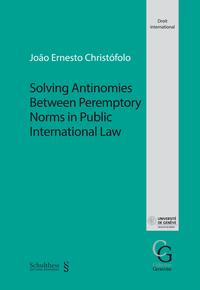
Ius cogens has been a subject of great interest in international law studies. But the inquiry into the collision between peremptory norms has been virtually non-existent. This book aims at addressing this particular doctrinal gap. Antinomies between ius cogens norms may arise in the conflicting simultaneous application of the peremptory norms on human rights, the non-use of force and self-determination. In order to determine how norms of ius cogens might be applied in situations of normative conflict - either apparent or real ones -, the author suggests the use of “weighing and balancing” techniques. After analysing the main theories on the issue, and describing the most commonly accepted peremptory norms in current international law, this work approaches the problem of antinomies between peremptory norms by applying “weighing and balancing” techniques to two case studies. First, the apparent conflict between the prohibition of the use of force and the prohibition of the most serious violations of human rights and international humanitarian law, as embodied in the notion of “humanitarian intervention”. Second, the real conflict between the prohibition of the use of force and the right to self-determination as conveyed by a hypothetical Israeli-Palestinian peace agreement entailing the partial cession of occupied territories. Norms of ius cogens are known for regulating sensitive and highly axiological matters, as shown by these two case studies. As a result, finding answers to the problem of conflicting peremptory norms is important not only as regards the doctrinal advancement in the field of international law, but also for the purpose of reaching lawful solutions to central concerns of the international community at large.